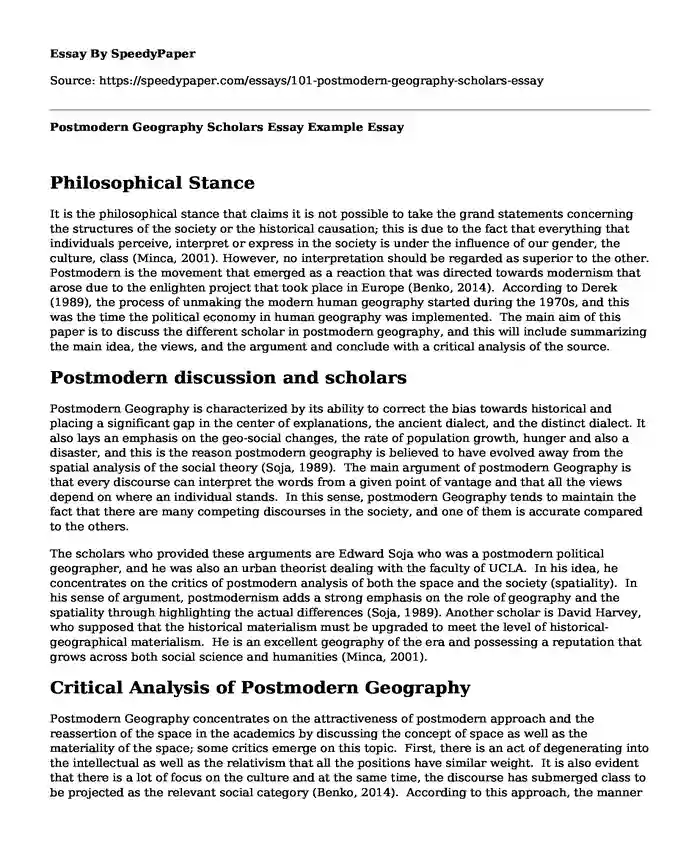Philosophical Stance
It is the philosophical stance that claims it is not possible to take the grand statements concerning the structures of the society or the historical causation; this is due to the fact that everything that individuals perceive, interpret or express in the society is under the influence of our gender, the culture, class (Minca, 2001). However, no interpretation should be regarded as superior to the other. Postmodern is the movement that emerged as a reaction that was directed towards modernism that arose due to the enlighten project that took place in Europe (Benko, 2014). According to Derek (1989), the process of unmaking the modern human geography started during the 1970s, and this was the time the political economy in human geography was implemented. The main aim of this paper is to discuss the different scholar in postmodern geography, and this will include summarizing the main idea, the views, and the argument and conclude with a critical analysis of the source.
Postmodern discussion and scholars
Postmodern Geography is characterized by its ability to correct the bias towards historical and placing a significant gap in the center of explanations, the ancient dialect, and the distinct dialect. It also lays an emphasis on the geo-social changes, the rate of population growth, hunger and also a disaster, and this is the reason postmodern geography is believed to have evolved away from the spatial analysis of the social theory (Soja, 1989). The main argument of postmodern Geography is that every discourse can interpret the words from a given point of vantage and that all the views depend on where an individual stands. In this sense, postmodern Geography tends to maintain the fact that there are many competing discourses in the society, and one of them is accurate compared to the others.
The scholars who provided these arguments are Edward Soja who was a postmodern political geographer, and he was also an urban theorist dealing with the faculty of UCLA. In his idea, he concentrates on the critics of postmodern analysis of both the space and the society (spatiality). In his sense of argument, postmodernism adds a strong emphasis on the role of geography and the spatiality through highlighting the actual differences (Soja, 1989). Another scholar is David Harvey, who supposed that the historical materialism must be upgraded to meet the level of historical-geographical materialism. He is an excellent geography of the era and possessing a reputation that grows across both social science and humanities (Minca, 2001).
Critical Analysis of Postmodern Geography
Postmodern Geography concentrates on the attractiveness of postmodern approach and the reassertion of the space in the academics by discussing the concept of space as well as the materiality of the space; some critics emerge on this topic. First, there is an act of degenerating into the intellectual as well as the relativism that all the positions have similar weight. It is also evident that there is a lot of focus on the culture and at the same time, the discourse has submerged class to be projected as the relevant social category (Benko, 2014). According to this approach, the manner in which Geography has been discussed and presented is very different. Although may believe it is an appropriate method, there are chances of people getting lost if they follow the ideas that presented by the scholars. Further, postmodern geography, as well as the cultural turns, have a critical impact on the given subject because it may lead to the retreat from the policy research as well as the modes of inquiry (Minca, 2001).
Although the issues discussed by the scholars in postmodern geography seem reliable, some questions emerge at the end. Soja states that geography plays an integral role in the emancipatory politics as well as in history, and this has been unduly privileged over the previous years. The explanation and the description provided by Soja are well structured, but Soja has not provided an explanation on how this is unduly privileged (Soja, 1989). Did this occur in the past or it is something that has taken place in the recent years. Further, the postmodern geography narrates the tale on the neglects as well as the dawning of the reassertion of the space basing the argument on ontology (Minca, 2001). However, there is little evidence provided in these cases making them remain as abstract, and there is the need to test so that they can provide a lasting conclusion.
In summation, Postmodern Geography is the process of unmaking the modern human geography started during the 1970s, and this was the time the political economy in human geography was implemented. It is also a process that the scholars in post-modern Geography provide evidence on how geography has been neglected as well its role in the political projects. The main scholars who have contributed significantly to this topic are Edward Soja and David Harvey. However, as much as these two scholars have provided critical arguments, there is a lot that has been left out, and they need to explain to avoid any concerns.
Cite this page
Postmodern Geography Scholars Essay Example. (2018, Sep 17). Retrieved from https://speedypaper.com/essays/101-postmodern-geography-scholars-essay
Request Removal
If you are the original author of this essay and no longer wish to have it published on the SpeedyPaper website, please click below to request its removal:
- Free Essay: Analysis of an Article on Photolytic Compounds
- Essay Example on Leadership Theories
- Free Essay on How Hegemonic Masculinity Has Increased Violence Against Women in Bangladesh
- Research Assessment Statement on Food Safety Regulation, Essay Example
- Behavioral Finance, Article Review Essay Sample
- Essay Sample: Environment Ethical Theories
- Paper Example - Emily Grierson's Character Analysis
Popular categories





